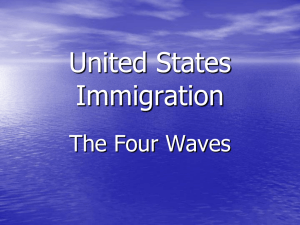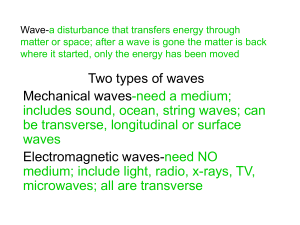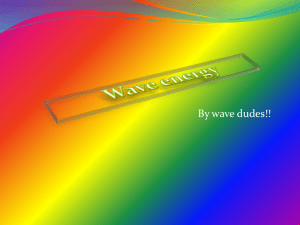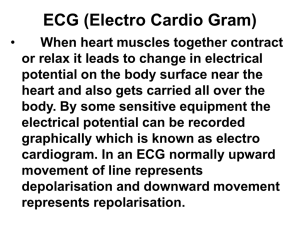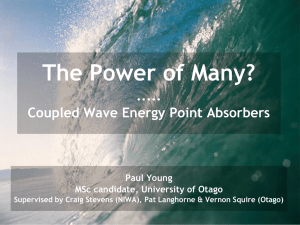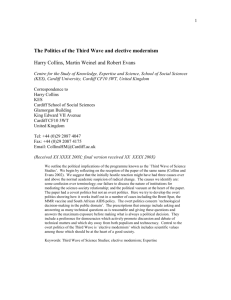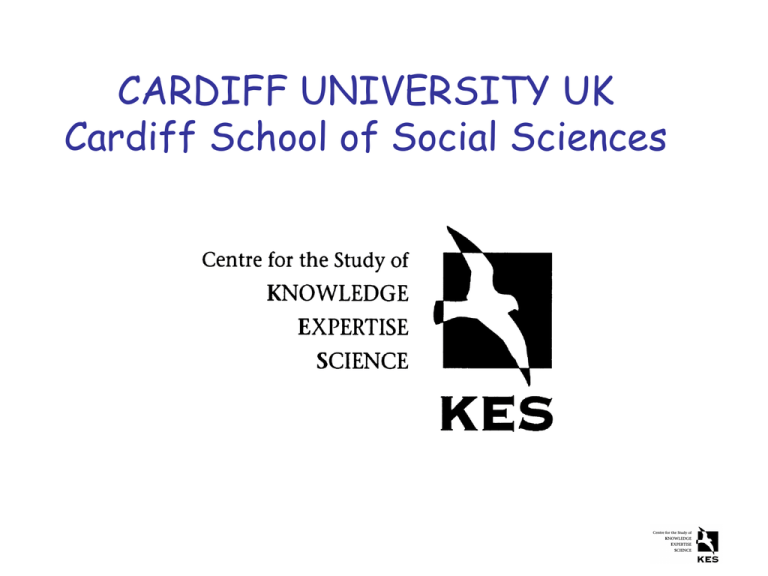
CARDIFF UNIVERSITY UK
Cardiff School of Social Sciences
The iconic question
How can relativism, fascinating though it is,
help me understand what to say to
someone from the South African
townships who claims that sex with a
virgin will cure AIDS?
Origin
The 2002 paper intended as un-contentious – a small
increment to science studies, solving an intellectual
problem
WAVE 1
WAVE 2
Science is a mundane
social process
Science has
special
THE LOGIC: science,
authority
per se, cannot have a
Produces
distinctive role in
certain results
policy
timelessly and
without social
Default response:
process
“Democratisation”
Science
policy can be
“read off”
from science
WAVE 3
Levelling the Doman
Mount Science
Cultural plain
Cultural plain
Origin
The 2002 paper intended as un-contentious – a small
increment to science studies, solving an intellectual
problem
WAVE 1
WAVE 2
WAVE 3
Science is a mundane
social process
Recreate a role
for science in
policy
Science has
special
THE LOGIC: science,
authority
per se, cannot have a Even without Wave 2
Produces
distinctive role in “speed of politics is
certain results
policy
faster than speed of
timelessly and
scientific
without social
Default response:
consensus
process
formation”
“Democratisation”
Science
so solution needed
policy can be
“read off”
“Technological
“FROM
TRUTH
from science
Populism”
TO EXPERTISE”
Problem of extension must be
resolved
Wave 1’s definition of expert is incorrect.
Expertise extends into the formally
unqualified – experience-based experts
But how far? There must be a limit or the
notion of specialist expert is dissolved
This is The Problem of Extension
To resolve it must understand expertise
Levelling the Doman
Cultural plain
No change of mind
JUST SHIFT OF ATTENTION TO
NEW TOPIC
THE NATURE OF
SCIENTIFIC
KNOWLEDGE
Focus of
attention
HOW TO MAKE
POLICY USING
SCIENTIFIC
KNOWLEDGE
Not a rejection
Not a rejection of anything
Not a change of mind about anything
Annoying when people say things like:
Remarkably, and to his credit, Collins recently softened his
critical stance of science significantly, publishing a short
essay [in Nature] entitled “We cannot live by scepticism
alone” (From Pigliucci, 2010 Nonsense on Stilts, p322)
One expects this from science warriors but
not from social scientists – but that is what
happened – a cliché of resistance to
innovation
Why the intensity of reaction?
“Professional” reasons aside, perhaps 3rd Wave was seen
as a change of mind because STS has evolved.
Has it become less the study of scientific knowledge and
more a political movement concerned with reducing the
power of science and scientists?
Relativism was understood to be a major contributor to
the reduction of the power of science – a shift of attention
to something non-relativistic was seen as a betrayal
If science studies’ main concern is reduction of the power
of science then the 3rd Wave is a problem because of its
concern with the Problem of Extension – which is an
attempt to retain some influence for scientific expertise
3Wave and power
But actually, 3Wave takes almost the same
position on the power and authority of science
as Wave 2.
It insists that scientists have no special warrant
outside their narrow specialisms
It opens up contributory expertise to experiencebased but untrained and uncertified experts
It insists that politics always trumps technical
opinion
But it wants to retain a place for some notion of
scientific and technical expertise
The positive side of the intensity of
reaction
Because of the intensity of reaction the
arguments had to be strongly defended
and developed in many directions
3rd Wave/SEE has become an extended
programme of research
Social theory
Philosophy
Division of labour
Education
Media Studies
Notion of collectivity
…
Fractal model
EXPERTISE DOMAIN
Tacit
Knowledge
Role of
language/practice
Interactional
Other
Ethnography
categories
expertise
Imitation
Anthropology
Periodic
game
EXPERTISE
table
Nature and
analysis
Sociology
LLI
Comparative
DEMARCATION
analysis of
Role of
societies
Elective
expertise in
modernism/
Real-time
decisionRawlsian
analysis
making
model
POLITICS
institutions
Political
Recognising
philosophy
POLITICS and
expertise and
scientific
STS
values
Relationship POLICY DOMAIN
Criminology
DOMAIN
between
…
science and
…
politics at
different
levels
Map of 3rd Wave/SEE
Psychology
Neuropsychology
Management
The new programme
Two strands:
1)
Technical: The analysis of expertise along with a new
method for measuring interactional expertise
2)
The World view:
(a) Re-establish notion of scientific and technical
expertise by solving the problem of extension
(b) Re-establish the central role of scientific norms in
the good society (Elective Modernism) and work out
the associated politics
2b is where 3rd Wave differs most markedly from the
Weltanschauung of core STS
The Politics of the 3rd Wave
Collins, Harry, Weinel, Martin and Evans, Robert, 2010. `The
Politics and Policy of the Third Wave: New Technologies and
Society’ Critical Policy Studies, 4, 2, 185-206)
Combat technological populism and, it turns
out, all forms of populism
Not anti-democratic but, perhaps, Rawlsian
democracy (Durant 2010)
Choose scientific values as central to society
as they are a subset of democratic values
(neo-Mertonian):`Elective Modernism’
Some crucial features
1. Science is a distinct form of life with
characteristic features linked by family
resemblance
2. Distinction between intrinsic and extrinsic
politics
3. `Political phase’ has priority over but must not
distort or subvert `technical phase’, only
publicly over-ride
4. Expertise is real and social scientists are
experts on expertise
Credo
3-Wave is neither anti-democratic nor
technocratic
`Democracy cannot dominate every domain
– that would destroy expertise – and
expertise cannot dominate every domain –
that would destroy democracy.’
Some conclusions
1 Recognise but do not endorse religious or populist
reasons in the making of technological decisions in the
public domain.
2 Frame technological issues imaginatively so as to bring
as many propositional questions and answers to the
table as might bear on the technological decision.
3 Never suppress or distort the opinions of experts even if
they must always be treated as subservient to politics
but, on the contrary, make sure that all relevant
answers to all relevant propositional questions are as
visible as possible.
4 A good society will be informed by, among other things,
scientific values for these are democratic values.
5 A good society will facilitate maximum scope for
discussion of political matters and maximum exposure
of technical matters.
6 Always aspire to keep the technical and the political
phase separate even where they are combined in
institutions or individuals.
Choose challenging cases for analysis
1
The Brent Spar oil rig:
Cannot analyse it without asking and trying
to answer propositional questions
The `impurity’ argument is religious
The utilitarian argument requires knowledge
of the effects of rigs (eg, nurture fish)
The `thin end of the wedge’ argument
demands social analysis – the answer to a
different kind of propositional question
Choose challenging cases for analysis
2
Thabo Mbeki’s AIDS policy:
It may have been politically motivated
But Mbeki said it was a scientific question,
distorting the technical phase and
disempowering the political process
SEE could show, in real time, how Mbeki’s
expertise was inappropriate to the making
of a scientific decision
Choose challenging cases for analysis
3
MMR vaccine revolt
Technological populism has led to deaths
and suffering of the powerless
The `lay experts’ were middle-class free
riders and it is disappointing to see social
scientists so misrepresent the distribution
of power in society
Choose challenging cases for analysis
4
Criminal justice and deterrence
Problem of populism: In the UK politicians
appealing to popular opinion in respect of
the deterrent effect of capital punishment
would immediately reintroduce it
In the more democratically responsive USA
this has happened
Same for punishment of criminals of all
sorts: retain expert role for criminologists
Choose challenging cases for analysis
5
Popular intervention in education policy
Student feedback/ parent choice?
Teaching of creationism/intelligent design?
Retain expert role for academics/teachers?
Concrete Institutions
WEBSITE
www.cf.ac.uk/socsi/expertise
(Or Google “Harry Collins Expertise”)
EMAIL TALK LIST
SEETALK-l@cardiff.ac.uk
ANNUAL WORKSHOP
SEESHOP1, 2, 3, 4 etc we hope
Jasanoff’s view
Jasanoff, 2003, writes:
3Wave is:
trying to lock the barn door after the horse has already
bolted. The worldwide movement in legislation and
public policy these days is toward, not away from, wider
participation … In general, Western states have
accepted the notion that democratic publics are adult
enough to determine how intensely and in what manner
they wish to engage with decision-making, subject only
to the constraints of time and other resources … If this is
the state of the world, then why should we pay attention
to work that seems on its face to be looking for principles
with which to limit the scope of public participation?
Jasanoff, S., 2003a. Breaking Waves in Science Studies: Comment on H.M. Collins and
Robert Evans, ‘The Third Wave of Science Studies’. Social Studies of Science 33(3),
389-400
Wynne’s view
… when Thabo Mbeki was pilloried a few years ago according to
western rationality standards, for apparently cleaving to the
propositional claim that HIV was not the cause of AIDS, he was said
by others who were closer to his thinking and speaking, to have
been saying, not that there is no causal connection between HIV
and AIDS, but something very different and orthogonal to the
propositional question in itself - that the causal progression of HIV to
full-blown AIDS is strongly exacerbated by poverty, malnutrition,
immune-system deficit, bad hygiene and sanitation conditions, and
other poverty-related conditions, which extravagantly expensive
western commercial drug responses (this was before cheaper but
still expensive more local generic drugs were available) advanced
by extortionate global corporations would not resolve, but would
compete with for investment. He was emphasising his view of the
need to focus priority on a different set of salient factors in the multifactorial situation. It was definitely an arguable position; but it was
not a superstitious expression of anti-real beliefs.
Email 2008

